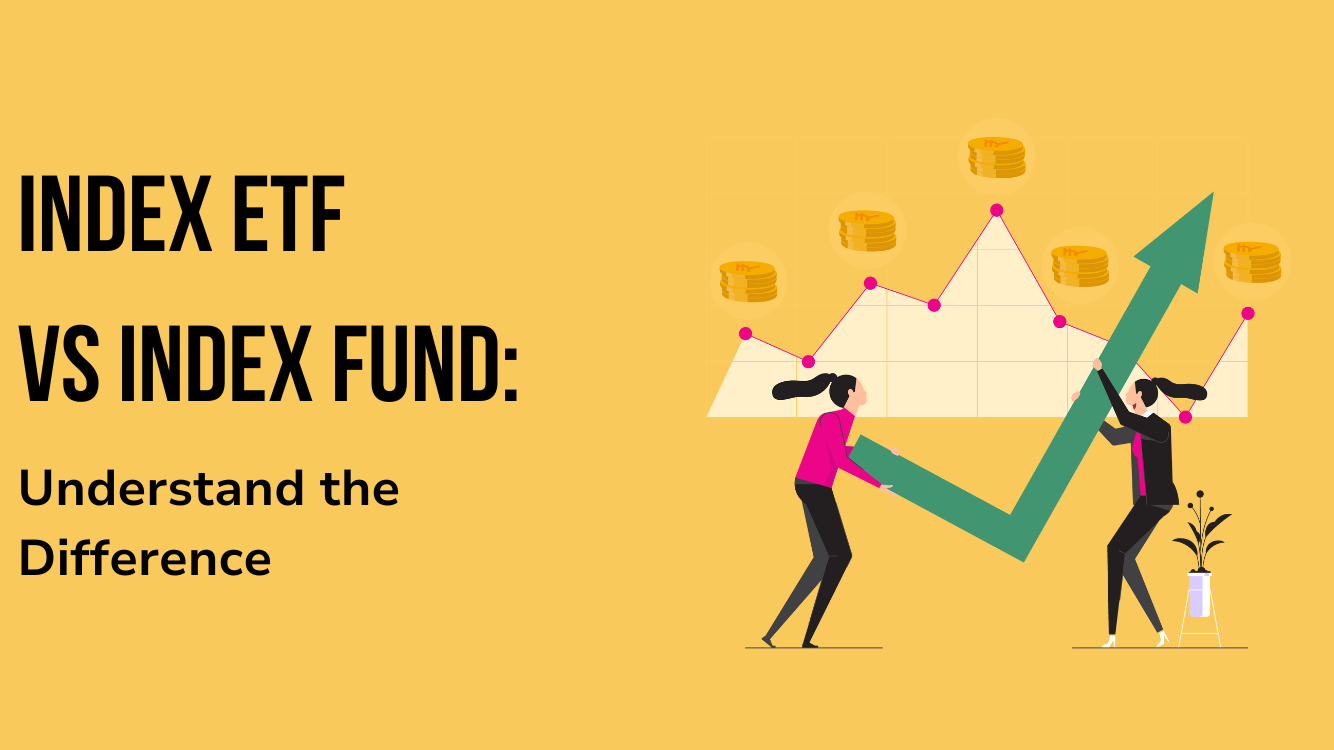Index ETF and Index Funds sound pretty similar, right? Well, there are some important differences between them that a woman investor should be aware of when investing in an index fund or ETF.
To simplify this, let’s first understand what index means? An Index is a group of stocks, bonds or any other securities that are similar to each other in terms of market sector, performance, investment strategy etc.
For example – Nifty 50 is an index representing the 50 largest companies in the NSE.
What is Index ETF?
An index ETF is a type of investment that tracks a particular market index. It tries to replicate the performance of the index as much as possible. They are traded on the stock exchange and can be bought or sold at market prices.
What are the benefits of Index ETF?
- Diversification: Investing in an index ETF offers exposure to a diversified portfolio of stocks, bonds, or other assets within that index.
- Low Costs: Index ETFs generally have lower expense ratios compared to actively managed funds because they passively track an index and require less active management.
- Liquidity: Index ETFs trade on stock exchanges, which means they can be bought and sold throughout the trading day at market prices. This liquidity provides investors with the flexibility to enter and exit the market at will.
What is Index Fund?
Index Funds are a type of mutual fund but they replicate a specific index. This means that they tend to invest in the same securities as the underlying index and try to mimic the performance of the index as well.
What are the benefits of Index Funds?
- Convenience: Index Funds are easy to invest in as they don’t require a demat account for investment.
- SIP Availability: Unlike Index ETFs, you can invest in Index Funds with regular monthly installments through SIP.
- No trading Costs: Index Funds don’t involve any trading costs as they can’t be traded on the stock exchange.
ETF vs. Index Fund
| PARAMETERS | INDEX ETFs | INDEX FUNDS |
| Structure | Exchange Traded Funds | Mutual Funds |
| Management | They can be traded on the stock exchange as per the will of the investor. | They are managed by fund managers. |
| Price | Its price fluctuates as per demand and supply. | It has a Net Asset Value (NAV) that is updated at the end of the day. |
| Demat A/C | Requires a Demat account | Doesn’t require a Demat account |
| Investment Method | SIP Investment is not available | Investment can be done through SIP or Lumpsum |
| Cost | Lower expense ratio than Index funds but may involve trading charges | Higher expense ratio than Index ETFs |
In conclusion, both Index Funds and Index ETFs attempt to mimic market indexes and replicate their performance. The primary difference between ETF and Index Funds lies in terms of their investment method. Index ETFs are traded on the stock exchange and require a demat a/c while Index Funds are purchased from Asset Management Companies (AMCs) and don’t require a demat a/c.
However, since Index Fund or ETF mimic the markets, they don’t generate an alpha (excess return over the return generated by the benchmark index) for the investors. To generate an alpha, women can explore investing in actively managed mutual funds portfolios.
To invest in actively managed MF portfolios, check out LXME an investment platform where you can find goal and time-based portfolios and start investing today! These portfolios are well-researched and are curated by experts. Begin your journey with just Rs. 100!
FAQ’s
What is the difference between index funds and index ETF?
The primary difference between ETF vs Index Funds lies in terms of their investment method. Index ETFs are traded on the stock exchange and require a demat a/c while Index Funds are purchased from Asset Management Companies (AMCs) and don’t require a demat a/c.
What are some benefits of Index Fund?
Some benefits of Index funds include convenience of investment, availability of SIP and zero trading costs.
Share this blog with your family and friends if you find it insightful!!
Download the LXME – women’s investing app for more such content!
New Investor? Request a Callback.
Fill in your details and we will guide you at every step
other blogs

Mutual Funds July 30, 2024
Smart Emergency Fund Investment: Building Financial Security
Welcome to our comprehensive guide on Emergency Fund Investment. In today’s unpredictable world, having a financial safety net is paramount. In this article, we’ll delve into the art of smart money management, helping you understand the best strategies for emergency fund investment and cover all the importance of emergency fund. Discover how to make your … Smart Emergency Fund Investment: Building Financial Security

Mutual Funds Saving July 29, 2024
7 Reasons Women Should Have Emergency Savings
Ladies, here’s a questionnaire for you: What would you do in case of a medical emergency? Ask for money from friends or put it on the credit card? What would you do if your company didn’t give you a maternity leave? Leave the job or keep working & stressing? What would you do if your … 7 Reasons Women Should Have Emergency Savings

Mutual Funds Saving
A Simplified Guide To Financial Planning for Women In India
Welcome to our insightful guide on financial planning for women in India! At LXME, we recognize the unique financial journey of women and provide a simplified approach to help you navigate through it. Discover empowering insights and expert advice on effective financial planning and investments tailored specifically for women. Let’s embark on this journey together … A Simplified Guide To Financial Planning for Women In India









